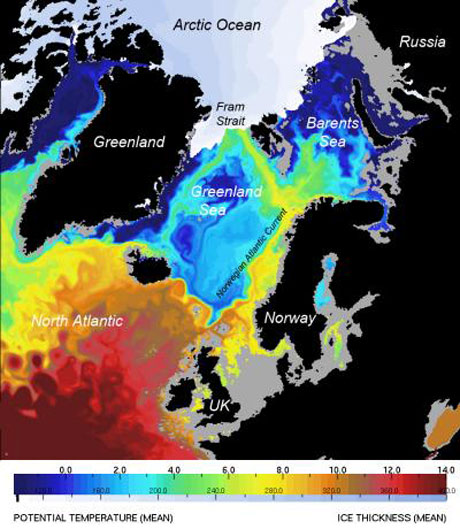This evening at 8-10 p.m. is the First Annual Reception for
CoRioLiS: LGBTQs & Friends in the American Meteorological Society.
Enjoy refreshments and hear from guest speaker Guy Walton, TWC forecaster, on “Acceptance and Innovation at The Weather Channel.” (By the way, after you hear Walton’s talk at the reception, consider catching his temperature extremes study Tuesday at 11 a.m.).
The reception, in the Juniper Room M2-North Tower of the Omni Hotel, in sponsored by the AMS Board on Women & Minorities, the UCAR Community Building Program, and the National Organization of Gay and Lesbian Scientists and Technical Professionals (NOGLSTP). For more information, contact Zhenya Gallon at ext. 8607, [email protected],
or see CoRioliS on Facebook.
Uncategorized
Get Hands-On at WeatherFest
Ready for some fun and games? Come to the kickoff of WeatherFest, a huge interactive science fair for weather enthusiasts of all ages. From noon to four on Sunday, nearly sixty exhibitors will feature a variety of displays designed to instill a love of science and learning. Meet your favorite local television meteorologist and learn how weather and climate affects daily life in Atlanta. Try a real weather forecast online at Forecast Central (http://forecastcentral.com) or create a “Cloud in a Bottle” at North Wasco District 21’s booth.

The Georgia Aquarium (http://georgiaaquarium.org) will be there with interactive hands-on games and activities. Learn how aquatic animals like penguins, sea otters, and beluga whales have adapted to survive chilly conditions. Georgia Tech Research Institute (http://gtri.gatech.edu) will have a mini-museum on the science and technology of lasers, with applications in meteorology. With a multitude of schools exhibiting at the event, it’s the perfect venue for both teachers and students looking to advance their knowledge.
For the kids there will be numerous weather games throughout the fest as well as raffle drawings. Check out AccuWeather’s Kids Weather Area featuring games, downloads, and “WheatherWhys,” or toss a balloon or two at CoCoRaHS’s (http://www.cocorahas.org/) Rain Gauge Water Balloon Toss.
WeatherFest is not only fun but free, so come get up close and personal with the weather on Sunday from noon to four in Registration Hall A/B at the Georgia World Congress Center.
How to Spot a Cloud Enthusiast
Sunday night is movie night at this year’s Atlanta meeting. While weather-related flicks will be playing near continuously at the DVD theater this week, the 7 p.m. showing Sunday is U.S. premiere of the BBC4 program,  “Cloudspotting,” a paean to the beauties, mysteries, and wonders of the sky. Narrator Gavin Pretor-Pinney, founder of the Cloud Appreciation Society, draws on art, science, mythology, and a deep love of the sky that will undoubtedly resonate with AMS attendees and their families. We suspect there will be plenty of true cloudspotters in the audience.
“Cloudspotting,” a paean to the beauties, mysteries, and wonders of the sky. Narrator Gavin Pretor-Pinney, founder of the Cloud Appreciation Society, draws on art, science, mythology, and a deep love of the sky that will undoubtedly resonate with AMS attendees and their families. We suspect there will be plenty of true cloudspotters in the audience.
For a brief sample of the profound identification with the skies that Pretor-Pinney brings to this visually stunning 90-minute show, check out this little audio clip of him speaking at a recent author’s talk at Google, promoting his book, The Cloudspotter’s Guide.
Or follow up after the movie, when you have time, for the whole lecture:
Schedule Change
Unfortunately, due to a last-minute schedule change, David Schultz, author of the new AMS publication, Eloquent Science, will be unable to attend the Annual Meeting and participate in a number of presentations. However, Fred Carr of the University of Oklahoma graciously stepped in to cover the the “how-to’s” of publishing for David at today’s Student Conference, and the AMS book launch will still be held Monday (5:30-7:30 p.m.) at the AMS Resource Center (Exhibit Hall B2), at which AMS will be celebrating the release of three books–The AMS Weather Book, Eloquent Science, and Adaptive Governance and Climate Change (which will be released that day).
Light Show over Norway
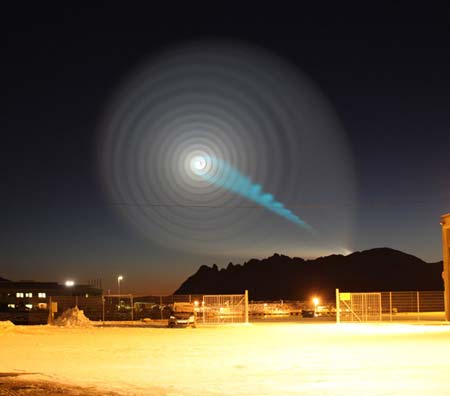
An unusual atmospheric phenomenon over Norway (above, photographed by Jan Petter Jørgensen) and elsewhere in northern Europe recently led some people to believe they were witnessing alien activity. Only later did the Russian Defense Ministry reveal that a test of an intercontinental missile launched from a submarine in the White Sea had failed at the same time as the mysterious display in the sky appeared.
While the Russians didn’t directly connect the two, many military experts noted that a malfunctioning missile could give such a spiraling appearance. So while the Land of the Midnight Sun apparently isn’t also the Land of the Midnight UFO, it does bring up the question for you, our readers: How does a missile cause this spiralling effect? Here’s one possible explanation:
The Ballots Are In…Now Meet the Winners
With the New Year comes the season for annual awards and “Best of” lists of every kind, from Oscars to best beer to best iPhone apps. But how often do you actually get invited to the awards ceremony? Here in Atlanta you can practically walk the red carpet with the winners.
On Wednesday at 4:45 p.m. (Publisher’s Row, Exhibit Hall), Atmospheric Science Librarians International (ASLI) will be presenting its fifth annual ASLI Choice awards for the Best Books of 2009.
This year’s winner in the “science” category is Clouds in the Perturbed Climate System: Their Relationship to Energy Balance, Atmospheric Dynamics, and Precipitation, edited by Jost Heintzenberg and Robert J. Charlson. According to ASLI, it was selected for its “quality, authoritativeness, and comprehensive coverage of new and important aspects of cloud research.” 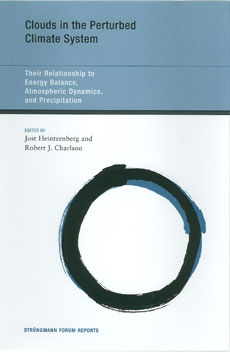
A new category for “popular” books was added to this year’s awards, and the winner is this class is Planet Ice: A Climate for Change, with photography by James Martin and essays by Yvon Chouinard. It was chosen for “beautiful photography accompanied by thoughtful essays on a topical and timely subject.”
Runners-up in the “science” category are Aerosol Pollution Impact on Precipitation : A Scientific Review, edited by Zev Levin and William R. Cotton, for an “authoritative, well organized, forum-based approach to the evaluation of a problem of global significance”; Hydroclimatology: Perspectives and Applications, by Marlyn L. Shelton, for a “well-considered, well-referenced text on an important topic”; and Climate Change and Biodiversity: Implications for Monitoring Science and Adaptive Planning, by D. C. MacIver, M. B. Karsh and N. Comer, for “good, clear authoritative statistical compilations, graphics, and charts on a important subject.”

And if we may blow our own horn for a moment, the runner-up in the “popular” category is Jack Williams’s AMS Weather Book: The Ultimate Guide to America’s Weather, with ASLI noting “its accessible and informative approach to all aspects of weather, and the richness of its illustrations.”
Publisher’s Row will also be the place to find the AMS books booth as well as some of the other leading publishers of atmospheric science books. In fact, along with the AMS Weather Book, two of the other ASLI’s Choice winners are published by companies that will be displaying their titles at the meeting: Aerosol Pollution Impact on Precipitation (published by Springer) and Hydroclimatology (published by Cambridge University Press).
Congratulations to all the winners!
Dress for the Ocean's Success

A group of organizations supporting the creation of a national policy to protect oceans, coasts, and lakes has declared Wednesday, January 13, “Wear Blue for Oceans” Day. Rallies will be held in 10 cities across the nation, including San Francisco, New Orleans, Honolulu, and Washington D.C. To show your support, organizers are asking you to wear blue, even if you’re not attending, so here are two of our suggestions for tomorrow’s attire.
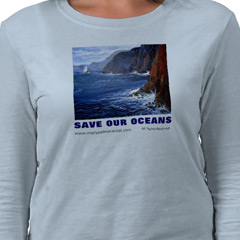
Harsh Cold Wave Slowly Retreating
Well, the big winter cold snap that has been gripping much of the United States since December is nearing its end. Temperatures in most places from the Plains to the East Coast have started to rebound and no renewed surges of Arctic air are on the horizon after a final weak front moves through the East Tuesday. But the damage is done in places from the Dakotas and Montana to Florida: burst pipes, roads that drifted shut, and wind chills lower than -50 in the North, and car crashes on icy roads, power outages, and record cold that has chilled the South.

Last Thursday, the wind chill in Bowbells, North Dakota hit 52° F below zero. That degree of cold “freezes your nostrils, your eyes water, and your chest burns from breathing — and that’s just going from the house to your vehicle,” said Jane Tetrault of Burke County. Her vehicle started, but the tires were frozen. “It was bump, bump, bump all the way to work with the flat spots on my tires,” she said, adding, “It was a pretty rough ride.”
Snow and icy winds whipped southward from the Midwest into Tennessee, Georgia, and Alabama late in the week, making travel a disaster in Memphis and Atlanta. Video of cars sliding off roads or into each other played every half hour on The Weather Channel into the weekend.
Even the Sunshine State had wintry precipitation with this unusual cold surge—something not seen in more than 30 years. The weekend into Monday was especially brutal by Florida standards. With temperatures in the 30s and low 40s, light rain enveloped the peninsula Friday night through Saturday. Sleet fell in spots from Jacksonville and Ocala southward through Orlando, Tampa, and Melbourne into Palm Beach. A few wet snowflakes mixed in here and there with snow reported by trained spotters as far south as Kendall, a southern suburb of Miami. In some places north of Tampa, enough sleet accumulated on cars and outdoor furniture to build little “sleet” men, complete with tiny hats and tree-twig arms, their photos rivaling those taken of snowmen built in Tampa on January 17, 1977. (View a of Florida sleet from a snow and ice slideshow on Tampa’s baynews9.com.)
Clearing led to record morning lows both Sunday and Monday that threatened harm to Florida’s $3 billion citrus industry. Temperatures bottomed out at 25° in Tampa, 29° in Orlando, and 31° in Ft. Myers. On Sunday, the temperature in Miami tied the 1970 record for the date with 35°, and a 36° low Monday morning broke the previous record for the date of 37° set in 1927. Despite the records, it has been the duration of the cold, especially in the South, that makes this cold snap memorable. Morning after morning since the previous weekend, photos of Florida strawberries encased in ice showed up on newscasts. Such protective measures against the frigid temperatures are expected for several more mornings in central Florida, even as the chill slowly moderates.
The cold was even long-lasting in the Midwest and Plains, as noted in TWC meteorologist Tim Ballisty’s article “It’s Cold But So What?” last week. He points out that Chicago hasn’t been above freezing since Christmas Day, at the time 11 straight days and counting. Cleveland had 10 consecutive days of snow, and that count continued right into the weekend.
Unlike the extensive heat waves of recent summers, this long and harsh cold snap resulted in relatively few new temperature records. At the Annual Meeting in Atlanta, Gerry Meehl of NCAR will explore the rising ratio of record high temperatures to record low temperatures, which is expected to markedly increase by the middle of the century with current projections of climate warming.
Innovations in Climate Adaptation
UPDATE, 1/17/10: Due to a last-minute scheduling change, Amanda Lynch will be unable to attend the Annual Meeting. Adaptive Governance and Climate Change will still be a featured release at the AMS Book Launch Party on Monday.
The recent Copenhagen conference provided yet more evidence that countries with completely different priorities are often reluctant to enter into complex and costly agreements with each other. While international negotiations may seem cumbersome at best, some scholars argue that climate change may best be solved at the local–rather than international–level. Local action may not only be more effective but also could also someday might lead to international agreements.
This local-first policy approach will be explored in a variety of ways at the AMS Annual Meeting, headlined by the release of a new AMS book, Adaptive Governance and Climate Change, by Ronald Brunner and Amanda Lynch. Brunner and Lynch show how locally based programs foster the necessary diversity and innovation for climate adaptation. 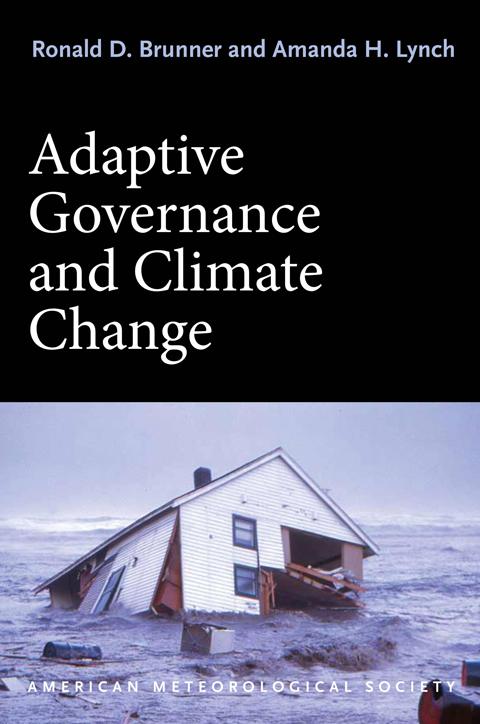 Their book focuses on the real-life climate issues faced by Barrow, Alaska—and analyzes how the policies developed to address those issues could be adopted by other communities.
Their book focuses on the real-life climate issues faced by Barrow, Alaska—and analyzes how the policies developed to address those issues could be adopted by other communities.
In Atlanta, Lynch will be available to discuss these policy perspectives when the book is released as part of the AMS Book Launch Party (Monday, 5:30 p.m., exhibit hall B1, booth 146). In addition, she will be signing copies of the book on Monday and Wednesday (2:45–4:00 p.m., exhibit hall B2).
Communities across the world are moving toward adaptive governance, as can be seen in a number of presentations at the Annual Meeting. Nanteza Jamiat’s poster on “Adaptation Challenges to Climate Change Disasters in the Karamoja Cluster (Cattle Corridor) in Uganda” (at the student poster session, Sunday, 5:30–7:00 p.m., exhibit hall B2) addresses the interrelationship of climate change and agriculture in a country where both are a way of life for most of the population. Barry Smit’s presentation on “Traditional Knowledge and Adaptation to Climate Change in the Canadian Arctic” (Wednesday, 9:00–9:15 a.m, B213) focuses on indigenous people in the Arctic and the cultural barriers that sometimes need to be broken in order to implement local adaptation initiatives. The Pacific Island nation of Tuvalu is the subject of “Weathering the Waves: Climate Change, Politics, and Vulnerability in Tuvalu,” a poster by Heather Lazrus (Monday, 2:30–4:00 p.m., exhibit hall B2) that shows how one of the most vulnerable areas in the world is in some cases reverting to traditional governmental methods to meet the perils of climate change. And Cynthia Fowler’s presentation on “Coping in Kodi: Local Knowledge about and Responses to Climate Change and Variable Weather on Sumba (Eastern Indonesia)” (Tuesday, 4:15-4:30 p.m., B213) notes that many people in Indonesia’s marginal environments relate climate change to local development, thus crystallizing in one small area many of the problems that were evident at Copenhagen between developing and developed countries.
Charting the Course of Arctic Warmth…and Oceanography
While many parts of the country have recently been experiencing conditions that residents might call “Arctic,” the Arctic region itself has been warming since at least the early 1990s, reaching warmth unprecedented in the last century. The consequences for global climate are potentially critical―particularly if fresh water from melting ice and increased atmospheric precipitation in the Arctic slow the overturning circulation of the North Atlantic. With Arctic sea ice melting dramatically in recent years, scientists are trying to understand the influence of the warmer water that flows into the Arctic from the North Atlantic.
At the National Oceanography Centre (NOCS) in Southampton, United Kingdom, scientists using high-resolution computer models found that from 1989 to 2009, about 50% of the salty North Atlantic water entering the Arctic Ocean came through Fram Strait, a deep channel between Greenland and the Norwegian island of Spitsbergen that connects the Nordic Seas to the Arctic Ocean. The Barents Sea contributes about as much Atlantic water to the Arctic, but the Fram Strait water carried most of the heat that has been a primary cause of Arctic ice melting.
An example of the modeling in this study, published in the January 2010 issue of Journal of Marine Systems, can be seen in the image below, which shows a computer simulation of ocean temperatures at a depth of 100 meters and sea ice thickness in September 2006. The pathways of warm saline water toward the Arctic have previously been poorly understood, but here the 8-km resolution defines three distinct pathways for this water to move under the more pure Arctic water, thus pumping heat northward between 50 and 170 meters below the surface.
“Computers are now powerful enough to run multidecadal global simulations at high resolution,” said NOCS scientist Yevgeny Aksenov. “This helps to understand how the ocean is changing and to plan observational programs so as to make measurements at sea more efficient.”
Ocean-climate interactions are a primary focus of the ocean science research priorities recommended by the U.S. National Science and Technology Council’s Joint Subcommittee on Ocean Science and Technology (JSOST) in their 2007 report, “Charting the Course for Ocean Science in the United States for the Next Decade: An Ocean Research Priorities Plan and Implementation Strategy.” As our understanding continues to evolve regarding the ocean and its influence on the Earth system, the priorities outlined in this report have also evolved. A town hall meeting on “Refreshing Our Ocean Research Priorities” (Monday, 12:15–1:15 p.m., B212) at the upcoming AMS Annual Meeting will explore some of these developments and give participants a forum to discuss topics of interest with the chairs of JSOST.
